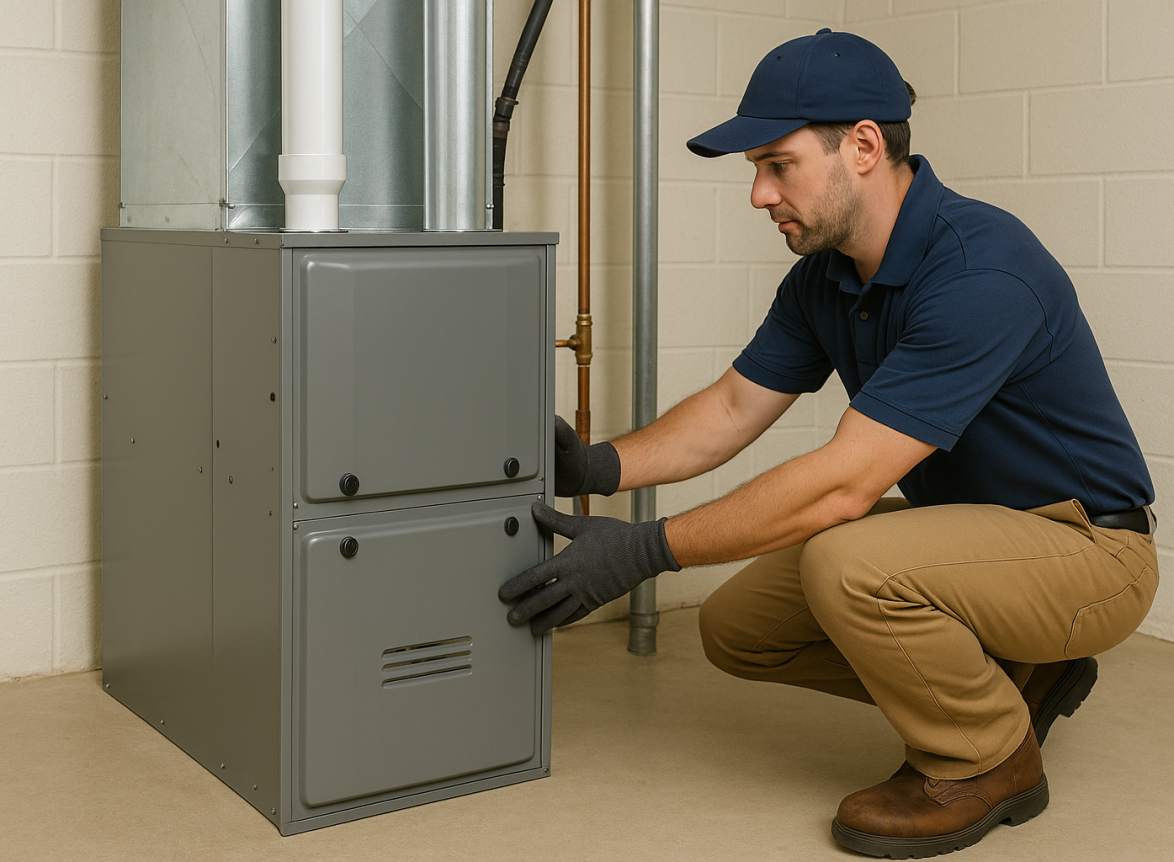Replacing a furnace is one of the biggest home expenses you will face, and 2025 is no exception. Prices are trending higher due to rising material costs, new efficiency requirements, and labor shortages. If your current unit is aging, inefficient, or failing, knowing the real furnace replacement cost helps you prepare. This guide covers current pricing, what affects costs, and how to make the most out of rebates and assistance programs.
Key Highlights
- Furnace replacement cost in 2025 averages $4,200 to $8,000 depending on type and size.
- Gas furnaces cost more upfront but usually have lower monthly operating expenses.
- Electric furnaces are cheaper to install but can lead to higher long-term utility bills.
- Installation complexity, regional labor rates, and efficiency ratings all play major roles in final cost.
- Federal and state rebates, such as those outlined by the U.S. Department of Energy, can reduce expenses for high-efficiency units.
Average Furnace Replacement Cost in 2025
The national average for furnace replacement in 2025 ranges from $14,200 to $18,000. The price includes equipment, labor, and often removal of the old unit. Homes in colder regions with larger heating loads will be on the higher end of that scale, while smaller homes or units with simpler installs may fall closer to the lower range.
If you search furnace replacement near me, you’ll find local contractors often provide free quotes, which can help narrow the estimate to your specific region. Costs may also change depending on whether you choose a basic unit or a high-efficiency system that meets the latest federal energy standards.
Gas Furnace Replacement Cost
Gas furnaces remain the top choice for homeowners across the country. A standard 80% AFUE gas furnace typically costs $14,500 to $16,500 installed. High-efficiency condensing gas furnaces, which range between 95% and 98% AFUE, cost $16,500 to $18,500 when factoring in venting modifications. These systems carry a higher price tag but save hundreds per year on heating bills.
Electric Furnace Replacement Cost
Electric furnaces are usually less expensive to install, often priced between $13,500 and $15,000. Since they don’t require venting or gas lines, installation is simpler. However, monthly energy bills are usually higher than with gas, especially in colder climates. For homes without natural gas access, electric remains a practical choice.
Oil and Propane Furnace Costs
Oil furnaces cost an average of $15,000 to $17,500, while propane furnaces typically run $14,800 to $17,200. These systems are more common in rural areas without natural gas service. Both options require fuel storage, adding to the initial installation cost.
What Impacts Furnace Replacement Cost
Several major factors affect your total furnace replacement cost. While equipment price is the largest portion, installation conditions and home characteristics play a role as well.
Size of the Furnace
The heating capacity, measured in BTUs, directly affects cost. Larger furnaces designed for big homes cost more. Contractors perform Manual J load calculations to ensure the furnace is sized properly. Oversizing or undersizing a system can lead to inefficiency and reduced lifespan.
Efficiency Rating
Efficiency is measured by AFUE, or Annual Fuel Utilization Efficiency. An 80% AFUE furnace wastes 20% of the fuel it uses, while a 95% AFUE wastes only 5%. Higher efficiency models cost $1,000 to $2,000 more upfront, but provide long-term savings on energy bills.
Installation Complexity
Homes with outdated ductwork, venting requirements, or restricted spaces increase installation costs. Multi-story homes or units being moved to a new location also add labor hours. These complications can add $500 to $2,000 depending on the work required.
Regional Differences
Your location affects both labor rates and system type. Northern states often require larger or higher-efficiency furnaces, while warmer climates can use smaller, less expensive models. Urban areas usually have higher contractor rates compared to rural regions.
Rebates and Tax Credits
Federal and state incentives help offset the cost of furnace replacement. The Inflation Reduction Act allows homeowners to claim tax credits of up to $600 for eligible furnaces meeting certain efficiency levels. Local utilities also run rebate programs for upgrading to high-efficiency models.
To see current programs, visit the U.S. Department of Energy, which tracks national and state-level rebate opportunities. These programs can save you hundreds or even thousands on a new system.
When Should You Replace a Furnace
Knowing when to replace instead of repair is an important decision. If your system is over 15 years old or repairs cost more than $500 annually, replacement often makes more financial sense.
Signs It’s Time for Replacement
- Furnace is 15–20 years old
- Energy bills have risen steadily despite maintenance
- Repairs are becoming frequent and costly
- Uneven heating across different rooms
- System runs constantly without reaching set temperature
Searching for furnace replacement near me is the fastest way to get evaluations from licensed contractors in your area.
Choosing the Right Furnace
The right furnace balances efficiency, upfront cost, and long-term operating expenses.
Gas Furnaces vs Electric Furnaces
- Gas furnaces usually have lower monthly costs but require venting and fuel lines.
- Electric furnaces are cheaper to install and easier to set up but more expensive to operate.
Oil and Propane Furnaces
While less common, oil and propane units are strong options in rural areas. They require storage tanks and fuel deliveries but can provide reliable heating for homes without gas lines.
Final Thoughts
Replacing a furnace in 2025 is a major investment, with average costs running between $14,200 and $18,000. Factors like efficiency, fuel type, home size, and installation complexity all impact the price. Rebates and tax credits can help reduce your total bill, while working with reputable contractors ensures proper installation.
If you are considering furnace replacement, take time to gather multiple quotes, explore efficiency incentives, and weigh long-term savings against upfront costs. Making an informed choice now will keep your home comfortable and your energy bills under control for years to come.


